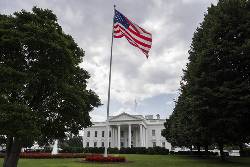WASHINGTON (AP) — The Trump administration is pushing an initiative for millions of Americans to upload personal health data and medical records on new apps and systems run by private tech companies, promising that will make it easier to access health records and monitor wellness.
Leaders from more than 60 companies, including major tech companies such as Google and Amazon, as well as prominent hospital systems like the Cleveland Clinic, will convene at the White House on Wednesday afternoon to discuss what the administration is calling a “digital health ecosystem." The new system will focus on diabetes and weight management, conversational artificial intelligence that helps patients, and digital tools such as QR codes and apps that register patients for check-ins or track medications.
The initiative, spearheaded by an administration that has already freely shared highly personal data about Americans in ways that have tested legal bounds, could put patients' desires for more convenience at their doctor’s office on a collision course with their expectations that their medical information be kept private.
“There are enormous ethical and legal concerns,” said Lawrence Gostin, a Georgetown University law professor who specializes in public health. “Patients across America should be very worried that their medical records are going to be used in ways that harm them and their families.”
Officials at the Centers for Medicare and Medicaid Services, in charge of maintaining the system, have said patients will need to opt in for the sharing of their medical records and data, which will be kept secure.
Officials say patients will benefit from a system that lets them quickly call up their own records without the hallmark difficulties, such as requiring the use of fax machines to share documents, that have prevented them from doing so in the past.
“We have the tools and information available now to empower patients to improve their outcomes and their healthcare experience,” Dr. Mehmet Oz, the administrator for CMS, said in a statement Wednesday.
Once the system is set up, popular weight loss and fitness subscription service Noom, which has signed onto the initiative, will be able to pull medical records, including labs or tests, of its users into its AI-driven analysis of what might help users lose weight, CEO Geoff Cook told The Associated Press.
“Right now you have a lot of siloed data,” Cook said.
Patients who travel across the country for treatment at the Cleveland Clinic often have a hard time obtaining all their medical records from various providers, said the hospital system's CEO, Tomislav Mihaljevic. He said the new system would eliminate that barrier, which sometimes delays treatment or prevents doctors from making an accurate diagnosis because they do not have a full view of a patient's medical history.
Having seamless access to health app data, such as what patients are eating or how much they are exercising, will also help doctors manage obesity and other chronic diseases, Mihaljevic said.
“These apps give us insight about what’s happening with the patient’s health outside of the physician's office,” he said.
CMS will also recommend a list of apps on Medicare.gov that are designed to help people manage chronic diseases, as well as help them select health care providers and insurance plans.
Digital privacy advocates are skeptical that patients will be able to count on their data being stored securely.
The federal government has done little to regulate health apps or telehealth programs, said Jeffrey Chester at the Center for Digital Democracy.
Health and Human Services Secretary Robert F. Kennedy Jr. and those within his circle have pushed for more technology in health care, advocating for wearable devices that monitor wellness and telehealth.
Kennedy also sought to collect more data from Americans’ medical records, which he has previously said he wants to use to study autism and vaccine safety. Kennedy has filled the agency with staffers who have a history of working at or running health technology startups and businesses.
“This scheme is an open door for the further use and monetization of sensitive and personal health information,” Chester said.
...


 Copyright © 1996 - 2025 CoreComm Internet Services, Inc. All Rights Reserved. | View our
Copyright © 1996 - 2025 CoreComm Internet Services, Inc. All Rights Reserved. | View our